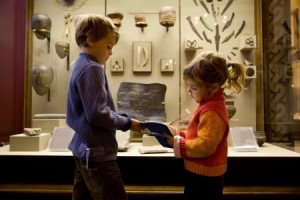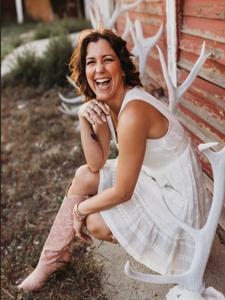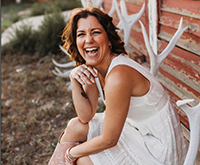Prairie Wife of the Week: Samantha (Dual Language Immersion Program)
Posted December 7, 2015 by BonitaBlueEyes -
Several years ago I was blessed to have the opportunity to help a very dear friend offer a Spanish immersion for preschoolers class for our community. During this time, I was able to meet several families who shared my biggest passions: our children, language, and education. Samantha attended our evening classes with her three beautiful children and we had many wonderful conversations about what our dreams were for our children and the opportunities that we desired for them in our community. Sam later went on to spearhead Casper’s first Mandarin Dual Language Immersion (DLI) Program, and later a Spanish program, with hope of adding more. These children spend half of their day learning math, science, social studies in the second language while the other half of the day is focused on English Language Arts. Watch this video to learn more about how this program works:
Sam lived and breathed DLI to bring this program here. You will see that she is very humble about this, but she really put in many hours to bring this opportunity to our children. She is truly an inspiring woman, and I feel so blessed to call her a friend.

BBE: Tell us about yourself and your family.
S: I grew up in Casper and attended many of the local public schools. I vividly remember my language classes (I took both Spanish and French) as something to do to get into college with zilch practicality (goodness, was I WRONG!). I left Wyoming for college and attended Colby College in Maine then transferred the University of Notre Dame in Indiana. I then went on to earn my masters in education at George Washington University in Washington, DC. After graduation, I worked in a variety of educational settings from elementary schools through college focusing mostly on the sciences. Currently, I am married with 4 children, three of whom are attending Paradise Valley Elementary School’s Mandarin program.
BBE: What prompted your interest in DLI Education?
S: I love speaking Spanish, but I am very bad at it. I’ve seen how being able to speak a second language can open doors socially and economically. I also did some work at a DLI school in Oregon.
BBE: What are the doors that can be opened by being bilingual?
S: When someone can speak another language, the ease of travel is huge. The ability to go places and meet people who are outside one’s native culture makes life-changing experiences more accessible. These experiences build on each other and lead to other life enhancing experiences. Whether it is an employer, a potential social contact or as simple as a family vacation choice, language, and the experiences gained by simply learning to communicate with others, can create a more interesting and engaging individual.
 BBE: Why should our children know about other cultures?
BBE: Why should our children know about other cultures?
S: Our world is a global world. It is a different world than the one we were educated to succeed in. When I was learning a language it was seen as a nice, but non-essential elective. Now, with businesses working worldwide, talent being sourced from all over the globe, online education programs like Khan Academy, our children’s future will look very different than our current reality. They will continue to compete with other students in Wyoming and our surrounding states, but will be competing with, and will continue to compete with, the best and the brightest worldwide. Not only will they need basic skills to compete globally, they will need the cultural competency to work in more diverse environments. Cultural competency is best learned living in other countries. The next best is by learning a language.
When someone has experienced a different culture, it is hard to hold onto stereotypes. There is nuance, circumstance and beauty in all cultures. It is my hope that my children will know men and women from Asia and Latin America (my two areas of focus) as compassionate, well-educated and cultured. I hope they will realize that all over the world there are people who have the ability to offer valuable contributions that will change humanity. Likewise, I hope people from all over the world will see American men and women in this same light.
BBE: You started working on bringing the same kind of program to Casper, Wyoming when your oldest was a preschooler. How did you know where to begin?
S: I must give credit where credit is due. There were some key NCSD (Natrona County School District) personnel and other community members who had seen the powerful educational effects that other DLI programs were having across the nation, particularly in Utah. They were trying to build support for the program here in Casper. I came to this effort late in the game when they needed parental demand. I desperately wanted my children to have the benefits of being bilingual so I put all of my effort into getting a program. I was also fortunate to have some very good friends with preschool children that immediately saw the long-term benefits to their children. They were crucial in building the momentum to get the first program off the ground. We actually held my son back a year so he could be a part of the first DLI class in Casper. It is a decision I have never regretted.
We are still building the institutional knowledge to support our current programs as well as watching to see how the students are handling the different style of learning. As these processes get put in place and the students continue to meet benchmarks, parents will begin asking for more seats. Once this all happens, the district should begin looking at adding another program. For this to happen, enough parents must let the district know that they are interested.
BBE: What is the procedure to get into the program?
S: There are a couple steps parents must go through to get into the program. Both programs have lottery placement so there is no guarantee of enrollment, but there are steps parents must take to get into the lottery. Parents must attend an informational session with the two principals. They will go through the structure of the program and talk about why it is a long-term commitment. This is not a program that can be tried for a few months then dropped. It is imperative that interested parents really consider whether the program is right for their family over the long term. Parents will be present at these meetings to answer questions from a parent’s perspective.
At the informational meeting, parents who are still interested will be asked to sign a commitment form. This form is necessary to enroll.
Once the lottery enrollment system is live (Usually in mid-January), parents will need to check the school AND the DLI program to be put in the lottery for the program. Then the list of parents will be cross-referenced with the signed commitment forms!
Families will find out if their student is placed in the program when the district sends out their placement letters in late spring. If a student is not placed in the DLI Program, the district will place the student on a wait list. Any open seats that become available will be filled from that wait list. If a parent does not choose DLI for the lottery system, they may opt to join the wait list. It is important to know that children cannot enroll in the program after the first year. This is because the amount of language learned in that first year is enormous . Anyone without a basic understanding in the language will be too far behind. The only exception to this is if the student has been exposed to the language at home or abroad and that decision is up to the principal. .When the lottery system is closed, there will be no chance to enroll a student unless there is an open seat.
 BBE: The kind of program I would like to see open is two-way immersion, where English language learners (whose first language is not English) are learning English while children who already speak English learn Spanish. (This creates many more language practice and cultural opportunities for the children than our current models.) What advice to do have for helping to make this a possibility?
BBE: The kind of program I would like to see open is two-way immersion, where English language learners (whose first language is not English) are learning English while children who already speak English learn Spanish. (This creates many more language practice and cultural opportunities for the children than our current models.) What advice to do have for helping to make this a possibility?S: I think a two-way immersion program would be a very smart next step. Jackson has a highly successful program that has been around for a number of years. National data demonstrates that English language learners actually perform better in a two way immersion program than in traditional ELL formats. It is also more economical. It would be a win win situation for the district.
BBE: Any last Prairie Wife words of wisdom?
S: Make time to go see DLI in action. Call the offices of Paradise Valley Elementary and Park Elementary and set up an appointment to observe a classroom. When you see students doing math, science, and social studies, conversing with other students and being highly successful in a language that you might not understand, you will want your child to have this opportunity. It is amazing to see these classes in action.
Contact Beth Millay at 307-253-3195 if you are interested in attending the mandatory informational meeting to enroll your child in a DLI program for the upcoming (2016-17) school year.
REMAINING INFORMATIONAL MEETINGS
– 12/8 – 12:00 p.m. (lunch provided, please RSVP to Beth Millay 253-3195) – 12/8 – 6:00 p.m.
– 12/15 – 6:00 p.m.
– 1/5/16 – 6:00 p.m. – 1/12/16 6:00 p.m.
Dec. 8th at noon (please RSVP to Beth Millay at number above)
Dec. 8th at 6pm
Dec. 15th at 6pm
Jan. 5th at 6pm
Jan. 12th at 6pm
If you have questions for Sam or anything about DLI, please comment below.
Copyright: paha_l / 123RF Stock Photo
Copyright: michaeljung / 123RF Stock Photo
Categories: Prairie Wife of the Week
Tags: , bilingual education, children, Culture, Dual Language Immersion, education, future of education, interview, Prairie Wife of the Week, school system, second language, spanish
Previous Post « Prairie Wives vs. Pinterest: Holiday Episode
Next Post Change Your Attitude »




